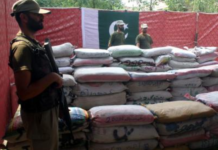Islamabad–Pakistani lawmakers have expressed fears that the $46 billion China-Pakistan Economic Corridor (CPEC) project, termed a “game changer” by the government, could turn into another East India Company if the country’s interests were not protected.
“Another East India Company is in offing… national interests are not being protected,” Dawn online quoted Senator Tahir Mashhadi, chairman of the Senate Standing Committee on Planning and Development, as saying on Monday.
“We are proud of the friendship between Pakistan and China, but the interests of the state should come first,” Mashhadi of the Mutahidda Qaumi Movement (MQM) told the committee when some members raised the concern that the government was not protecting the rights and interests of Pakistani people.
The East India Company was the British trading mission to India, which became the precursor to the British colonial presence in the subcontinent, eventually gaining power and overthrowing the Mughals who ruled the country at that time.
Following a briefing by Planning Commission Secretary Yousuf Nadeem Khokhar, committee members said they feared the utilisation of local financing for CPEC projects, instead of funding from Chinese or any other foreign investment.
They also expressed concern over fixing of tariff for CPEC-related power projects by China.
Pakistan Muslim League-Nawaz (PML-N) Senator Saeedul Hassan Mandokhail, the lone PML-N senator in attendance, also endorsed the committee member’s ideas.
The meeting was informed that a major portion of the CPEC depended on local finances than Chinese investment.
“It will be very harmful for us if we have to bear the entire burden; will this [project] be a national development or a calamity? Whatever loans taken from China will have to be paid by the poor people of Pakistan,” Mashhadi said.
Highlighting the status of CPEC-related projects, the Planning Commission secretary said the Matiari-Lahore transmission line project had “not been scrapped” and was being pursued by its Chinese sponsors.
Recently, the country’s National Energy Power Regulatory Authority (Nepra) had approved tariff for the project, while the government’s Private Power Infrastructure Board had filed a review petition on the tariff in order to address the sponsors’ concerns.
Senator Usman Khan Kakar, of Pashtoonkhwa Milli Awami Party (PMAP), said Nepra had fixed the power tariff at 71 paisas/unit, while the Chinese investors were demanding 95 paisas/unit.
“The government has filed an appeal before Nepra, seeking the increase despite the fact that the burden will be borne by poor consumers.”
According to the secretary, the Gadani power plant complex was shelved due to the lack of a dedicated jetty. The 6,000 MW project was not part of the CPEC.
Senator Kakar pointed out that despite the project not being a part of the CPEC, Chinese Ambassador Sun Weidong recently claimed the Gadani plant, an under-construction energy complex in Gadani, Balochistan, was not scrapped and was a part of the corridor.
“Why is this project, which does not even exist, being counted in our account?” he asked.
He said the infrastructure being established in Gwadar would only benefit the Chinese and Punjab governments, not the local community.
“The people of Balochistan will only get water supply from it,” he said, adding that no electricity or railway projects were planned for the province under the CPEC.
Senator Mandokhail said a sense of deprivation was being instilled in smaller provinces due to the mega corridor project. “We do not want the CPEC at the cost of the federation.”
Since Minister for Planning and Development Ahsan Iqbal was not present in the meeting, the Senator urged the secretary to ensure the integrity of the federation.
Jamaat-e-Islami Emir Senator Sirajul Haq said the Federally Administered Tribal Areas (Fata) and Pakistan-occupied Kashmir were being neglected in the CPEC.
“There is nothing for both areas in the CPEC,” he said, suggesting that a 35 km road be built to link Muzaffarabad to the CPEC.






